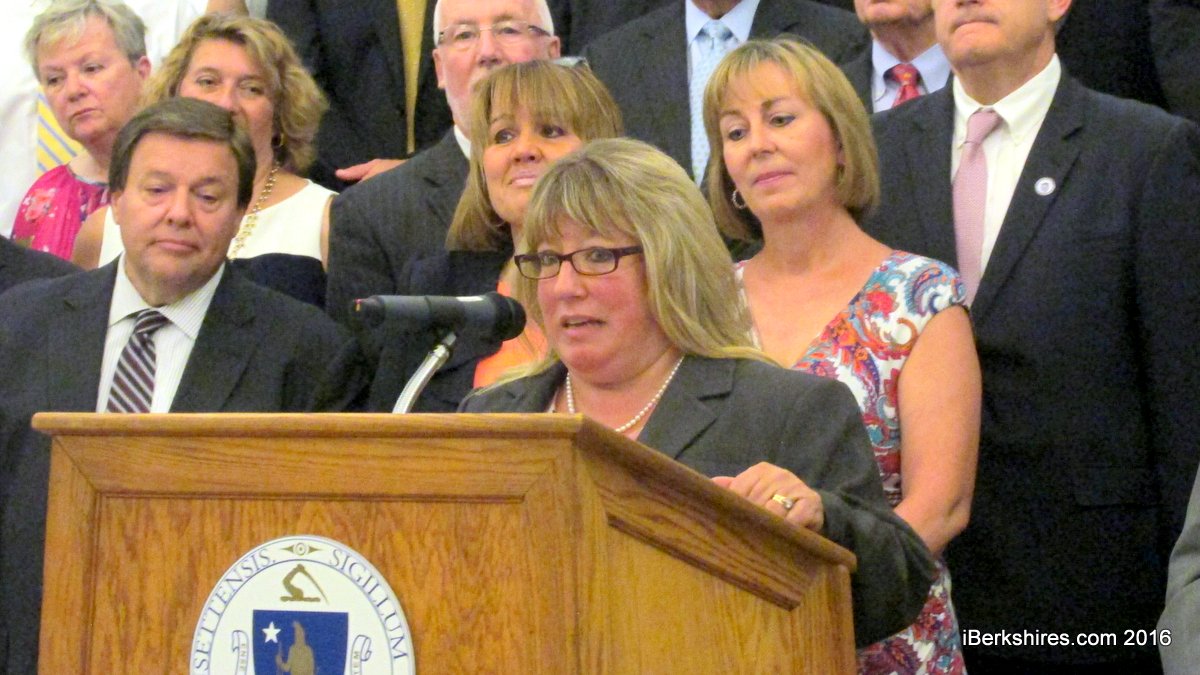



Governor Signs Legislation Updating Obsolete Municipal Regulations

BOSTON — Legislation signed at the State House on Tuesday eliminates or updates a raft of outdated and obsolete municipal regulations.
Filed by the Baker administration last December, the 125-page Municipal Modernization Act found strong support from state and local officials, the Massachusetts Municipal Association and Massachusetts Association of Assessing Officers.
Gov. Charlie Baker, with a host of local elected and administrative officials behind him on the Grand Staircase at the State House, noted he'd gotten some flack when he'd described the effort as "weed whacking" outdated laws.
"I took a fair amount of grief for it at the time, but just because this is full of lots of what we describe as arcane and off-the-beaten-track municipal and state law doesn't mean it doesn't matter," he said, adding it's "important work and it's been 50 years since the commonwealth updated a lot of the standards associated with local government."
The governor said just simplifying, eliminating or dramatically improving the flexibility "of item after item after item" will be an "enormous improvement with our communities' abilities to actually do the work they need to do on behalf the people they serve."
Among the bill's changes are easier opportunities for municipalities to save funds; to issue motor vehicle violation digitally; to create trust funds for post-employment benefits; to allow communities to file documentation online; to develop workforce housing, and to expand town's abilities to make year-end budget adjustments. The legislation also recognizes the reality of contemporary costs by extending local officials ability to spend on project and procurements from $10,000 to $50,000 without going to town meeting.
"We're thrilled," said MMA President Lisa Blackmer, noting that many small towns are often run by limited staff and volunteers who can be overwhelmed with complex regulations. "This bill you're signing today fixes a lot of that. ...
"I applaud Gov. Baker, Lt. Gov. Polito, and the House and Senate for building this powerful partnership with cities and towns and for standing with us to getting Massachusetts to a model for the rest of the nation."
The legislation has been part of the Baker and Lt. Gov. Karyn Polito's stated partnership with municipalities, which also saw the development of the Community Compact that created opportunities for municipalities to pursue best practices with technical help from the state. Polito has been point person on the compact program, traveling across the commonwealth and signing agreements with some 250 of its 351 municipalities.
Both Baker and Polito often point to their times serving as selectmen in their respective hometowns — Swampscott and Shrewsbury, respectively — as providing them insight into the needs of local government.
More than 100 local officials journeyed to Beacon Hill last year to provide input on regulations that have helped and hampered the functioning of local government.
"As state officials, we don't have all the answers, we need to ask the experts on the front lines," said Polito. "What changes can our commonwealth make to take regulations and laws and mandates that will preserve your ability to deliver quality services to your constituents in the most cost-effective manner? ...
"That one simple question yielded about 1,300 responses."
Polito said updating and simplifying local laws "will promote local independence, give more control to cities and towns across the commonwealth to make their decisions, streamline the oversight that our state has over local governments."
Lawrence Mayor Dan Rivera, another of the number of officials to speak, summed it up in his guiding principals: "don't move at the speed of government" and "liberate bureaucracy."
Many of the new laws will also have the added benefit of reducing and eliminating the need for multiple town meetings, an expensive proposition for small towns. Blackmer, a North Adams city councilor, offered one example of an insurance settlement, say for a wrecked police cruiser.
"To spend it on a new cruiser or to do anything with it, you have to go to town meeting and vote on it," she said. "So they raised that threshold to $150,000, which makes it much easier for the select board and the town administrators, managers to act quickly."
And while North Adams, the state's smallest city, has urban issues, it also has to deal with many of the same subjects as small towns, she said.
Clarksburg Town Administrator Carl McKinney, who had hoped to attend Tuesday's event, said afterward that he appreciated the efforts of the governor and lieutenant governor.
"They clearly understand the challenges cities and town struggle with when dealing with outdated and inefficient laws and regulations as they pertain to the administration and delivery of governmental services," he said. "This is a good start, and yet there is more to be done."
McKinney would like to see more on pro-rationing of benefits for part-time employees and exemptions from the prevailing wage laws for small projects under $50,000.
"This would allow more hiring of local tradesman in small companies from our own communities instead of having to contract with larger firms located out of the area, which in turn drives up the costs for doing everything," he said.
"I think it's going to streamline our procurement process to be able to do a lot of things faster that have frankly gotten bogged down," Lenox Town Manager Christopher Ketchen said.
The only Berkshire manager to attend the State House event, Ketchen thought it was "super" how so many partners were able to come together on not only a single bill, but one that as so many parts "that are going to be extremely helpful to towns."
"We all struggle with how slow government can go sometimes and it's all due to the arcane laws that we have to grapple with," he said. "Whether it's managers, town meetings ... everybody wins with a big package like this."
Updated on Aug. 10 to add in comments from McKinney.
Tags: Charlie Baker, legislation, MMA, municipal services, polito, State House,















